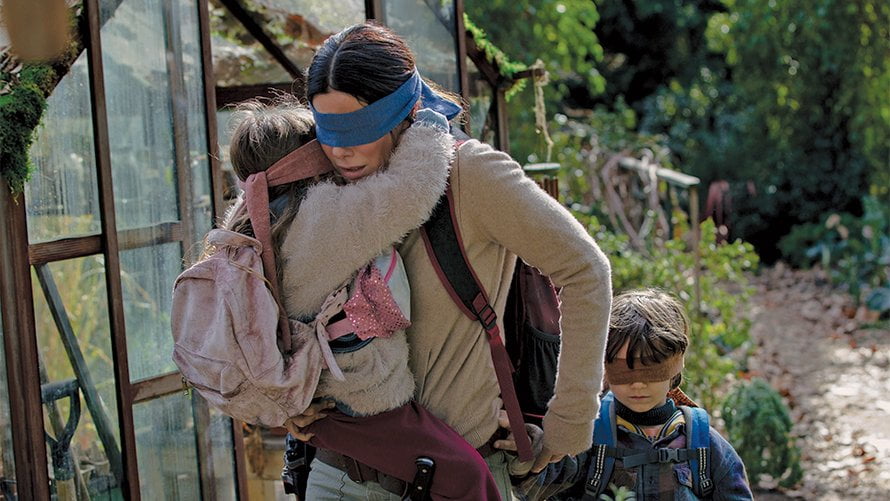
We originally started off with only Lisanne’s Bird Box review for Spiegeloog, but the heated discussions between Julia and Lisanne about the original review during our editorial meetings led us to make the decision to also let Julia publish a review. The Netflix original seems to be a film you either love or hate. It is up to you to decide which review you agree with.
We originally started off with only Lisanne’s Bird Box review for Spiegeloog, but the heated discussions between Julia and Lisanne about the original review during our editorial meetings led us to make the decision to also let Julia publish a review. The Netflix original seems to be a film you either love or hate. It is up to you to decide which review you agree with.

Have you ever imagined what you would do if you were the only one left in the world, like the characters in Bird Box seem to be? Maybe you imagined visiting museums for free, enjoying the nature peacefully or walking around in cities that are usually overcrowded. These are indeed nice things to do, unless there is a mass suicide happening around you, like in Bird Box. At first, these circumstances made me apprehensive about seeing the movie, but while watching, I was not impressed.
In Bird Box a small group of people, including the pregnant leading lady Malorie, are trapped inside a house after escaping a mass suicide. They try to keep their contact with the outer world to a bare minimum, because if they see ‘it’, they will get a sudden urge to kill themselves. ‘It’ seems to be an invisible force and only ‘psychos’ and the blind are not affected by it. The ‘normal’ people wear blindfolds under all circumstances when they’re outside in order to survive. In the house Malorie and another woman deliver their babies at the same time. The people in the house do everything to keep themselves and the babies safe, but this like seems an impossible task. Some do survive and we see them five years later, blindfolded on a river on their way to somewhere safe.
Although I enjoyed watching the movie, relative to how much you would enjoy watching a movie in suspense for what is to come, I really missed the moral of the story. There seemed to be no message the director, Susanne Bier, wanted to give her watchers. Maybe I shouldn’t expect a deeper, significant meaning from an apocalypse movie, but a meaning is really what makes a good story for me. The characters in the movie didn’t even really want to know where ‘it’ came from, why it caused the mass suicide, or why the ‘psychos’ wanted the ‘normal’ people to commit suicide while they were immune to ‘it’. The sole purpose of the characters was to survive. The distinction between psychiatric patients and normal people was very expressive in this movie which I thought was quite sad considering that we are striving so hard to make clear that black-and-white distinctions don’t exist. I didn’t get why the producers thought it was necessary to assign a bad role to psychiatric patients.
Furthermore, the ‘five years later’ storyline felt quite pointless to me. Contrary to what you might think if you only know Bird Box from the memes, the storyline on the river is not the most important one. Yes, some survivors are trying to get to a safer place, but how they survived those former five years is never made clear. The only interesting part for me was were Malorie was trying to ignore that she had a baby on the way and named him ‘Boy’ because she couldn’t bond with him.
Discussions made clear that not everyone interpreted the movie the same way. Some won’t agree with me that the people not effected by ‘it’, next to the blind, were psychos, hence I used quotation marks. Others say that when the characters saw ‘it’, they saw their own worst fears, while for me it wasn’t clear what ‘it’ was. Whether you like the movie, or not, might depend on your own interpretations of it. I, however, would not recommend it as a must-see. <<
Have you ever imagined what you would do if you were the only one left in the world, like the characters in Bird Box seem to be? Maybe you imagined visiting museums for free, enjoying the nature peacefully or walking around in cities that are usually overcrowded. These are indeed nice things to do, unless there is a mass suicide happening around you, like in Bird Box. At first, these circumstances made me apprehensive about seeing the movie, but while watching, I was not impressed.
In Bird Box a small group of people, including the pregnant leading lady Malorie, are trapped inside a house after escaping a mass suicide. They try to keep their contact with the outer world to a bare minimum, because if they see ‘it’, they will get a sudden urge to kill themselves. ‘It’ seems to be an invisible force and only ‘psychos’ and the blind are not affected by it. The ‘normal’ people wear blindfolds under all circumstances when they’re outside in order to survive. In the house Malorie and another woman deliver their babies at the same time. The people in the house do everything to keep themselves and the babies safe, but this like seems an impossible task. Some do survive and we see them five years later, blindfolded on a river on their way to somewhere safe.
Although I enjoyed watching the movie, relative to how much you would enjoy watching a movie in suspense for what is to come, I really missed the moral of the story. There seemed to be no message the director, Susanne Bier, wanted to give her watchers. Maybe I shouldn’t expect a deeper, significant meaning from an apocalypse movie, but a meaning is really what makes a good story for me. The characters in the movie didn’t even really want to know where ‘it’ came from, why it caused the mass suicide, or why the ‘psychos’ wanted the ‘normal’ people to commit suicide while they were immune to ‘it’. The sole purpose of the characters was to survive. The distinction between psychiatric patients and normal people was very expressive in this movie which I thought was quite sad considering that we are striving so hard to make clear that black-and-white distinctions don’t exist. I didn’t get why the producers thought it was necessary to assign a bad role to psychiatric patients.
Furthermore, the ‘five years later’ storyline felt quite pointless to me. Contrary to what you might think if you only know Bird Box from the memes, the storyline on the river is not the most important one. Yes, some survivors are trying to get to a safer place, but how they survived those former five years is never made clear. The only interesting part for me was were Malorie was trying to ignore that she had a baby on the way and named him ‘Boy’ because she couldn’t bond with him.
Discussions made clear that not everyone interpreted the movie the same way. Some won’t agree with me that the people not effected by ‘it’, next to the blind, were psychos, hence I used quotation marks. Others say that when the characters saw ‘it’, they saw their own worst fears, while for me it wasn’t clear what ‘it’ was. Whether you like the movie, or not, might depend on your own interpretations of it. I, however, would not recommend it as a must-see. <<



